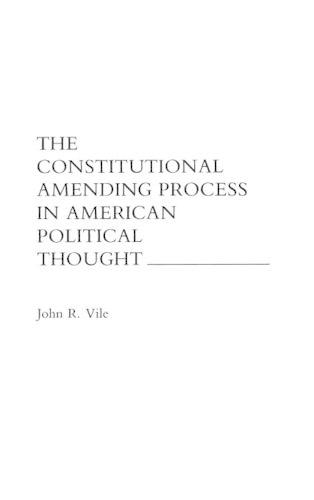
The Constitutional Amending Process in American Political Thought
(Hardback)
Publishing Details
The Constitutional Amending Process in American Political Thought
By (Author) John R. Vile
Bloomsbury Publishing PLC
Praeger Publishers Inc
30th May 1992
United States
Classifications
Tertiary Education
Non Fiction
Political structure and processes
347.3023
Physical Properties
Hardback
224
Description
This book is the first full-length work to present debates over the constitutional amending process as a perennial theme in American political thought. Beginning with a discussion of the views of political philosophers, publicists, and legal commentators who may have influenced the views of legal change held by the American Founding Fathers, the work proceeds to look at the historical influences on and discussions surrounding the amending process that was incorporated into Article V of the U.S. Constitution. The reader will gain a new respect for the way the amending process has served and still serves as a safety valve for constitutional change in the United States without permitting ill-considered or hastily conceived modifications. This work will be of interest to political scientists, historians, and students of American studies and legal history.
Reviews
With the passage of the 27th Amendment, Vile's analysis of the amending process is particularly timely even though the ratification of this particular amendment is not discussed. Vile summarizes prominent Western philosophers' views on legal change and then analyzes how this heritage affected the amending mechanisms developed by the American founders. Although Thomas Jefferson espoused periodic generational revisions of the Constitution in which every Constitution would expire at the end of 19 years, James Madison's critique of this position prevailed and the debate over the amending process produced a moderate amending process that allowed some change but also promoted stability. After the Civil War and the constitutional crisis it produced, various scholars (e.g., Sidney Fisher) began to doubt the efficacy of the amendment process. In the Progressive era, other scholars (e.g., Woodrow Wilson, James Bryce, Herman Ames) criticized the amendment process for requiring extraordinary concurrent majorities and for being overly rigid. Vile disagrees with the critics and argues that the amendment process was constructed properly and serves its designed purpose. Junior/senior undergraduates, graduate students, faculty, and general readers.-Choice
"With the passage of the 27th Amendment, Vile's analysis of the amending process is particularly timely even though the ratification of this particular amendment is not discussed. Vile summarizes prominent Western philosophers' views on legal change and then analyzes how this heritage affected the amending mechanisms developed by the American founders. Although Thomas Jefferson espoused periodic generational revisions of the Constitution in which every Constitution would expire at the end of 19 years, James Madison's critique of this position prevailed and the debate over the amending process produced a moderate amending process that allowed some change but also promoted stability. After the Civil War and the constitutional crisis it produced, various scholars (e.g., Sidney Fisher) began to doubt the efficacy of the amendment process. In the Progressive era, other scholars (e.g., Woodrow Wilson, James Bryce, Herman Ames) criticized the amendment process for requiring extraordinary concurrent majorities and for being overly rigid. Vile disagrees with the critics and argues that the amendment process was constructed properly and serves its designed purpose. Junior/senior undergraduates, graduate students, faculty, and general readers."-Choice
Author Bio
JOHN R. VILE is Professor and Chair in the Department of Political Science at Middle Tennessee State University. A graduate of the College of William and Mary and the University of Virginia, he is the author of Rewriting the United States Constitution (Praeger, 1991).
